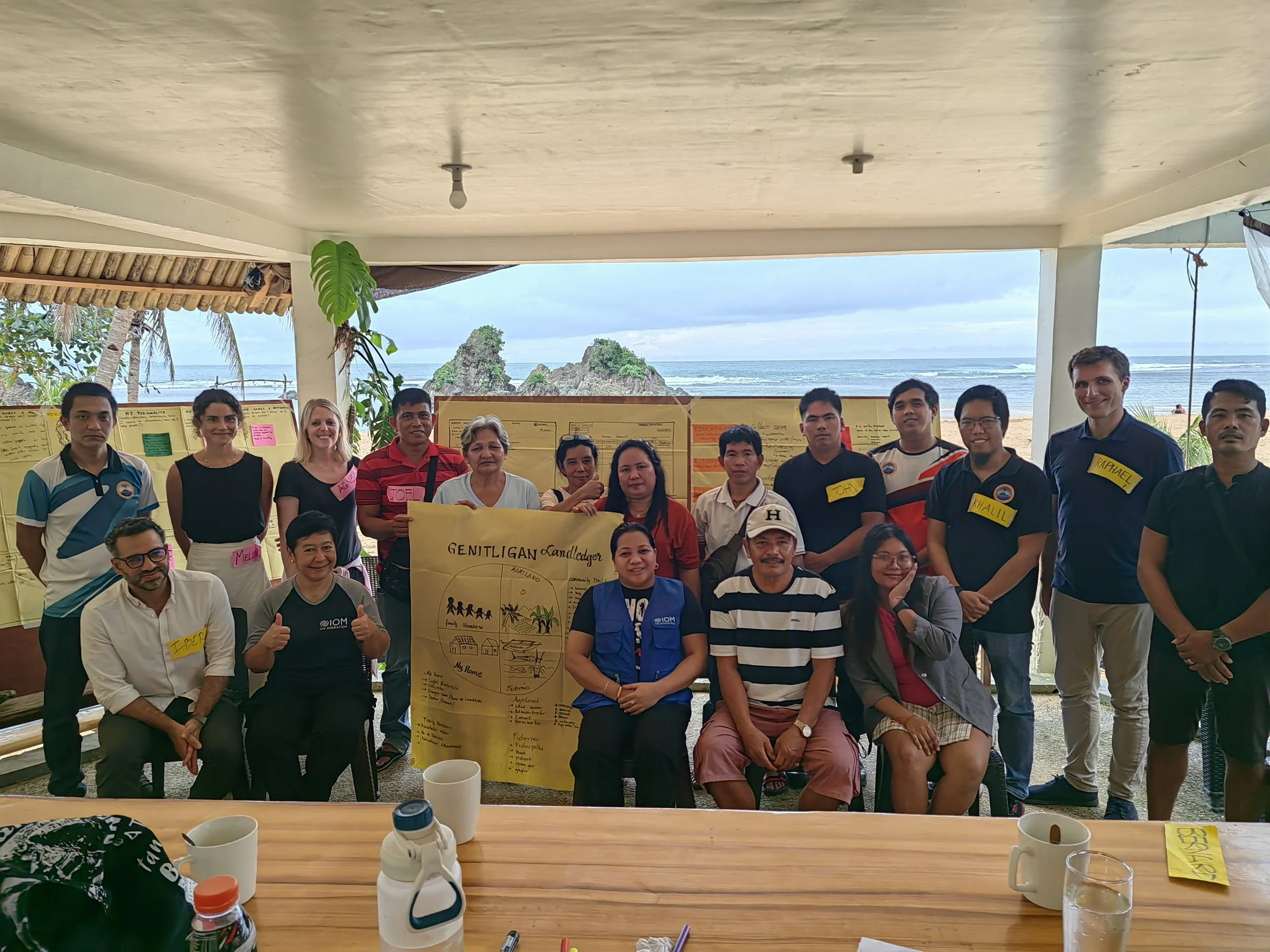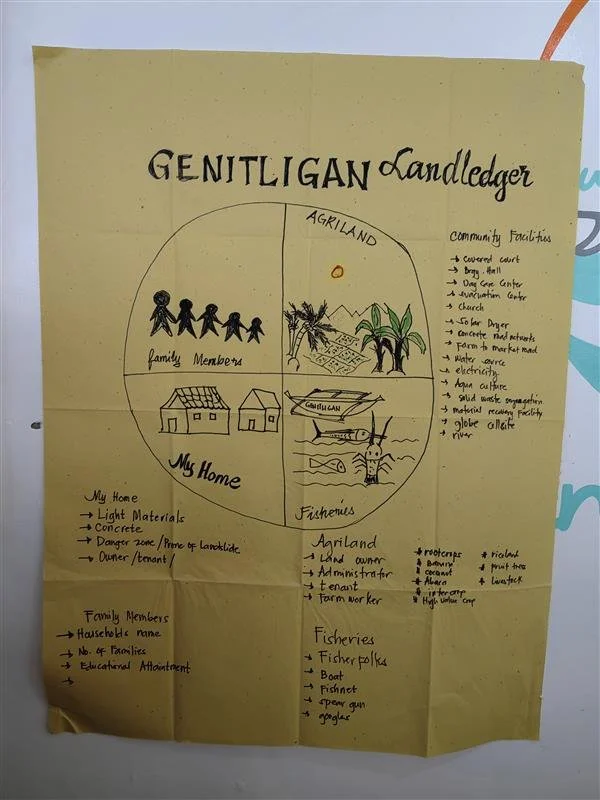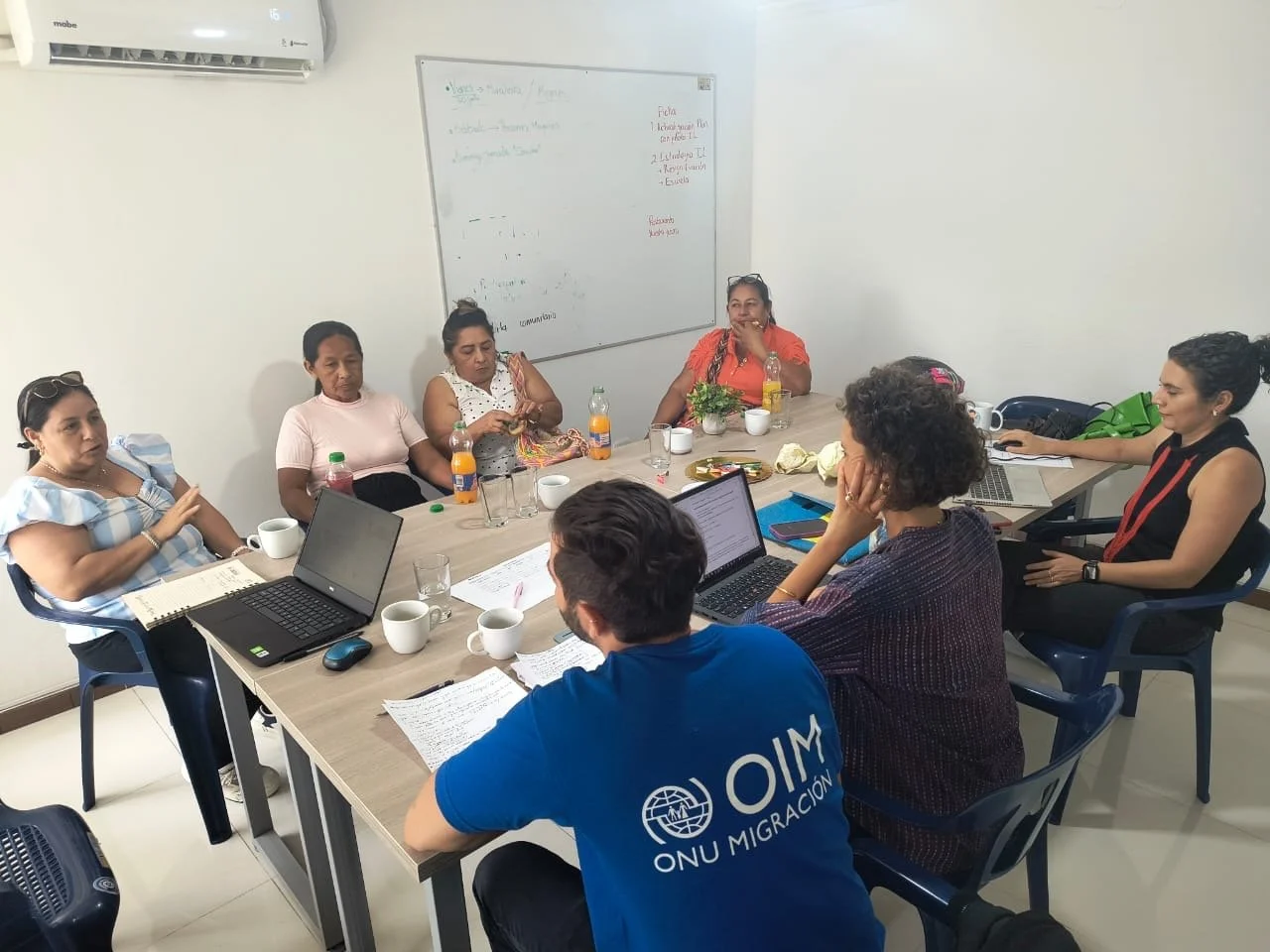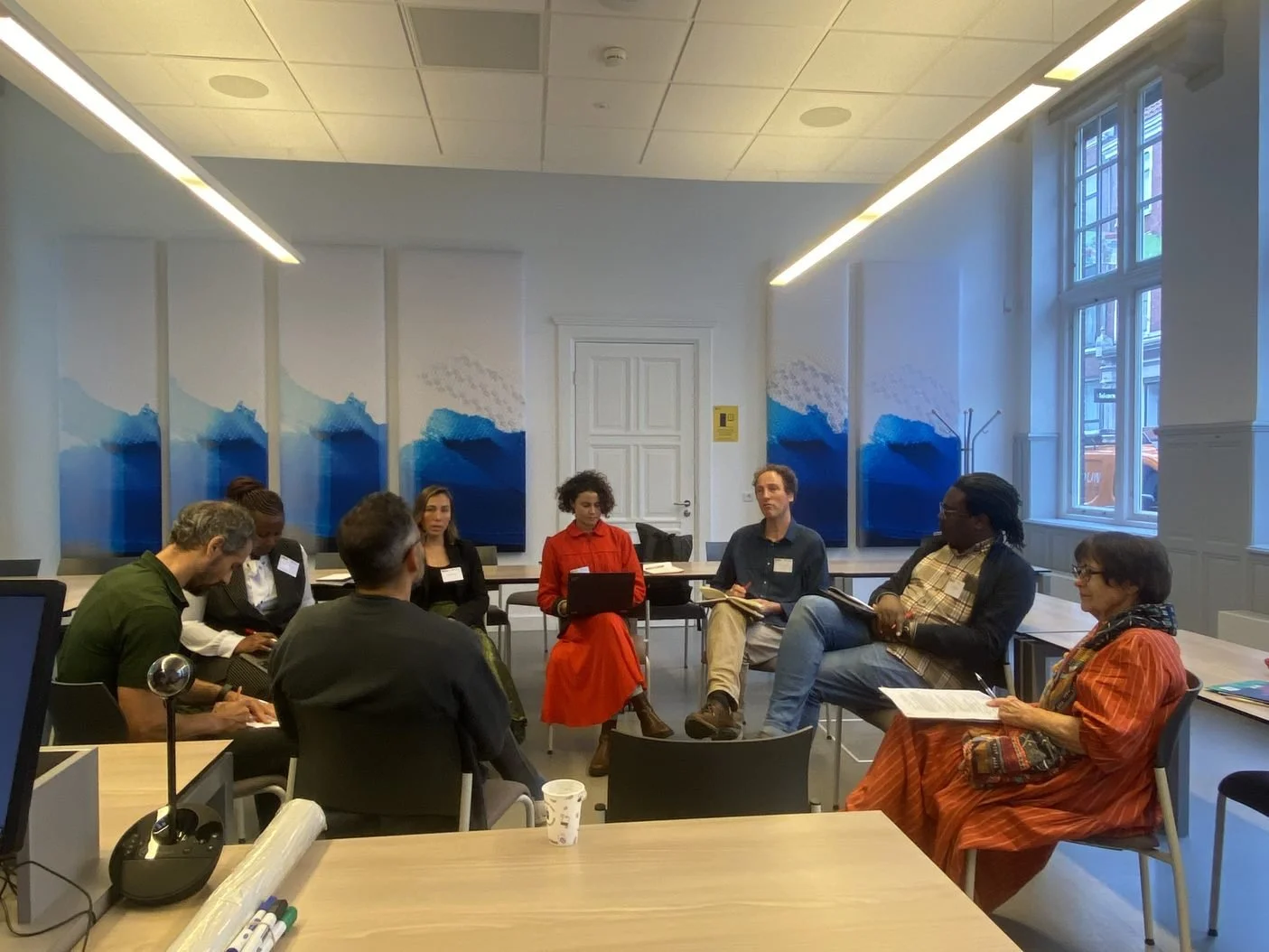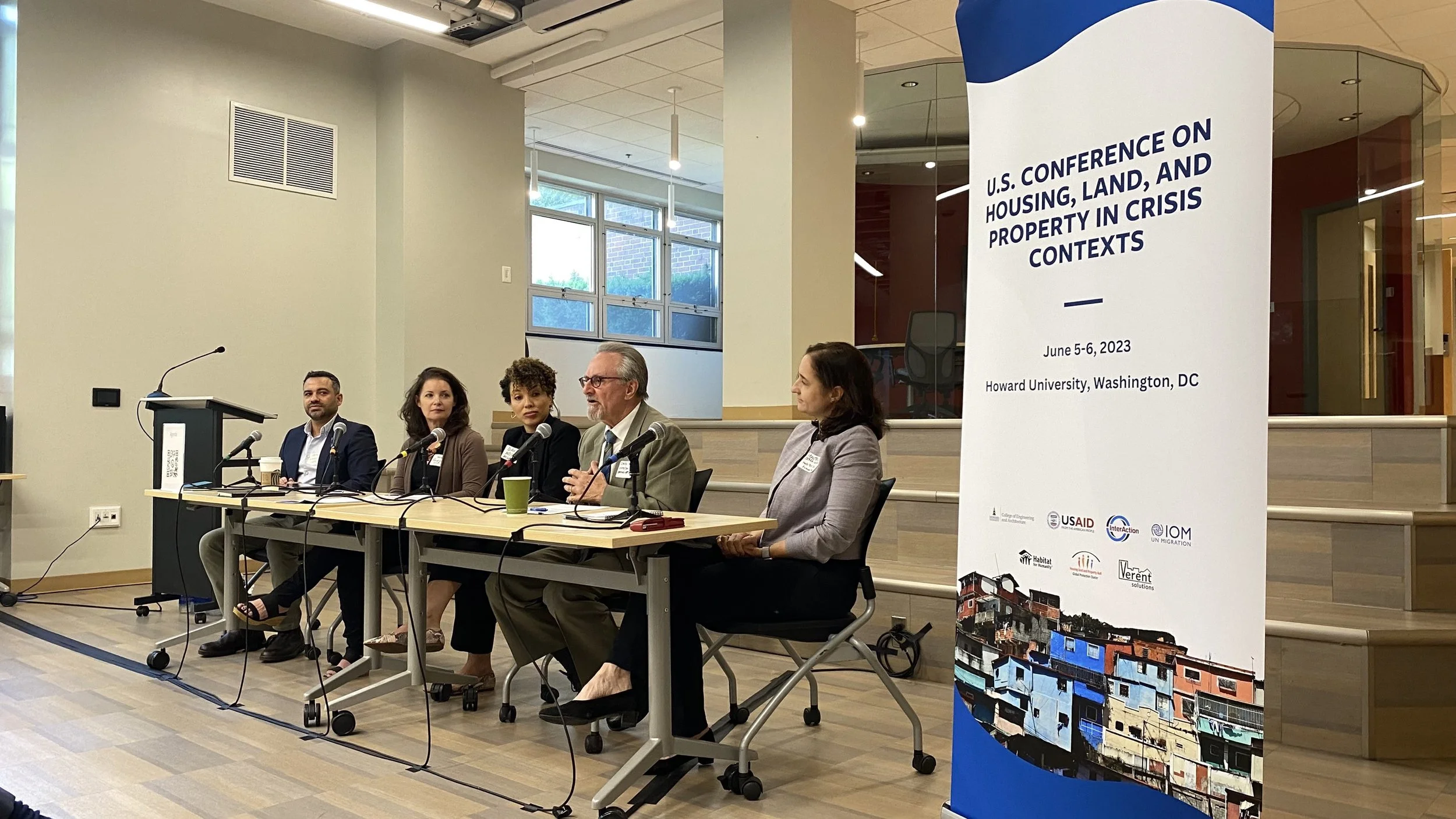Dialogues
Our team has run research assessment trips, collaborative community workshops, public and private sector dialogues, academic conferences, and roundtables with partners across industries and disciplines to best inform the development of LandLedger and what it can become.
Each new conversation–whether with a professor, cartographer, humanitarian, displaced person, or anything in between–offers a deeper, more nuanced, and more creative perspective on how to go about understanding and tending to the issues of housing, land, and property recordation in crisis contexts.
This is where the link will jump to
This is where the link will jump to
Philippines Co-Design Workshops
January 2025, Genitligan, Catanduanes, Philippines
We met with provincial and regional authorities and communities in Legazpi and Catanduanes island to better understand their concerns and needs in terms of tenure security and land recordation, and how LandLedger might best apply to their situation. Following our consultations, conversations, and workshops across the region, we settled on Genitligan Barangay as our pilot community after establishing a rich opportunity to support the community needs, their interest and involvement, and recognition of LandLedger’s value.
-
Participants
Farmers & fishermen
Senior Citizens
Barangay health worker
Chief and Local Govt Unit representatives
Municipal DRR representatives
Process
User Persona Creation for Community and Humanitarian application
User needs and solutions identification
Community & Humanitarian user journey mapping
Community & humanitarian platform visioning
-
Strong community desire to have documentation of payments and status of structures before disaster
Expressed concern over not having documented information about house, payment, length of time at property, form of acquisition, and who lives there
Recognition that a digital community record could strengthen disaster preparedness and preserve community identity
Strong openness to digital platforms and interest/willingness to take part in training for knowledge sharing and use of platform
-
Approximately 300 households
Heavily affected by disasters (inland and costal): landslides, typhoons, storm surge, and sea-level rise
Low levers of documentation
Recurring evacuation & displacement
Mixed tenure arrangements: occupants, inheritors, and paying tenants
Market Dialogues & Report
November 2024, Virtual
Our final market dialogue was help in November 2024, bringing together potential partners and collaborators to hear more about the LandLedger project and discuss the technological feature-set and needs to build a platform as intelligent as we need it to be. The conversation clarified questions about technical needs, while also finding tech integrations not previously considered.
Read the dialogues summary report here or watch the recording of the market dialogue below.
This is where the link will jump to
This is where the link will jump to
Colombia Needs Assessment
September 2024, Bogota D.C & Caqueta
Our Colombia needs assessment offered us an opportunity to learn how a team with a longstanding Housing, Land, and Property program navigates a country system that has mature institutions and a deep understanding of the value of land titling efforts. Through conversations with government agencies, NGOs, local IOM teams, and displaced community members, we were able to develop a much clearer vision and use-case for LandLedger’s application.
-
Understand displacement/return context in which formalization and restitution interventions have been implemented, and the successes and failures therein
Understand the systemic, programmatic, administrative, and technological barriers to a streamlined formalization and restitution process
Understand how informal information and documentation is valued, and whether titles and existing processes adequately capture/recognize certain types of rights and arrangements
Understand value-add to NGOs, government agencies, and communities of a tool like LandLedger to better inform its features and design requirements
Understand gender and minority-specific concerns that may require additional resources, and how they have been addressed thus far
Understand how a flexible, adaptable and quicker approach (with increased ability to corroborate) could have improved or could still improve the titling programme
Understand feasibility of community ownership for a tool like LandLedger, and the limits therein.
-
There are gaps at the community, municipal, and national levels in terms of technical support access and ability, database interoperability, real-time information access, and ability to validate claimant details.
The great chasm between those seeking a title and those receiving a title presents a major need for support and resources during the in-between, which can take years, and the country teams and communities we spoke with see a plethora of use-cases and value-add to a service like what the LandLedger platform seeks to provide.
-
We spoke with organizations and community members across a wide spectrum of the land titling process and system. These included government partners like ANT (National Land Agency), URT (Land Restitution Unit), ART (Rural Development Agency), IGAC (National Geographic and Cartographic Institute); teams like IOM Bogota and Caqueta, Kadaster/Tierra en Paz, Opcion Legal, and community workshops with families in Florencia, Caqueta.
World Bank Roundtable
June 2024, IOM D.C.
The brainstorm with World Bank colleagues and IOM staff helped walk through the idea of soft land rights and the concept of “land claim as story” to enable households and communities to best use the information and documentation at their disposal (which is incredibly variable) to better face crisis and displacement.
-
“Soft” View of Property Ownership: use information that is currently available to identify ‘soft’ claims for land rights.
Three Elements (property, claim, owner): Each claim is defined by a flexible view of the property, the ‘owner’ (which may a person, family, community, etc), and the nature of the property right.
Supported by Available information: descriptions of the property, owner, and claim are supported by currently available evidence (testimonies, family records, photos, community leaders, etc)
The Claim is a Story: Instead of the claim being limited to a hard set of formal records, each claim is a story based on currently available evidence and tailored to the situation.
This is where the link will jump to
This is where the link will jump to
LandAC Conference
July 2024, University of Utrecht
The Netherlands Land Academy (LANDac) network brings together academic researchers, private sector and civil society representatives, and policy makers in the field of land governance in development to research, share knowledge and examine pressing themes impacting land rights and access.
-
The 2024 LANDac conference focused on the challenge of uphold and extending social justice in the context of climate and clean energy transition impacts on land access and availability.
The main takeaways of the LandLedger brainstorm were on shifting the importance from traditional metrics to:
Focus on Community-level Data Collection
Prioritize Contextual Analysis and understanding
Engage Youth
Differentiate between claims and rights
Ensure ongoing data collection
Land Rights in Crisis Conference
May 2024, Howard University
The Conference on Housing, Land, and Property Rights in Crisis Contexts held in June 2023 brought together professionals, academics, donors, the private sector, the United Nations, international organizations, think tanks, and non-governmental organizations specializing in land tenure and property.
The conference sought to share experiences and practices related to housing, land and property (HLP) issues faced by displaced and at-risk communities to build a community of practice and identify steps forward. The conference also looked at HLP rights for marginalized communities within the United States–particularly Puerto Rico–to share learnings with colleagues working internationally.
-
● Understand how HLP rights link to climate, both in terms of how access to HLP rights can support climate resilience, mitigation and adaptation measures and how climate change impacts HLP rights.
● Understand how HLP rights intersect with many humanitarian sectors including protection, shelter, WASH, food security, nutrition, health, education, and others.
● Train humanitarian actors across sectors on how to conduct HLP due diligence.
● Share land rights mapping and recording tools with humanitarian aid implementing organizations.
● Continue to refine and develop approaches to demystify HLP to promote engagement of humanitarian actors on the concepts of tenure, security of tenure, tenure agreements, tenure systems, forced eviction, and due diligence.
● Create an online Community of Practice to continue discussion on HLP rights in crisis contexts between conferences.
● Support the development of HLP country briefs as an educational tool or pro-bono activity.
This is where the link will jump to

